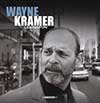“Lexington” is a free jazz record in the purest sense of the term. There’s not a lyric on the thing. Horns spar with piano and weave in and around time signatures that will leave rock and roll aficionados shaking their heads. Brother Wayne’s famed guitar tone is not properly sighted until side two (this is an LP with a download code) when the songs kick up a notch on the decibel scale.
The MC5 were always dancing with the jazz form of music. Mentor/manager John Sinclair used to climb on-stage and discordantly honk away on saxophone while singer Rob Tyner was an especially willing student of his teachings away from the performing space. You can hear the Albert Ayler and John Coltrane influences right through the first and third albums (Jon Landau banished them during the recording of “Back In The USA”) and on various live recordings.
Both Kramer and early band leader Fred “Sonic” Smith chased a sound that fused guitars and horns and it came to the fore on “High Time.” The revived version of the Five (aka DKT/MC5) that survivors Kramer, Mike Davis and Dennis Thompson took out on the road did shows with the Sun Ra Arkestra and various brass and horn players. That doesn’t mean “Lexington” won’t throw many fans for a spin when they hear it.
Kramer’s been off the radar for most people since DKT/MC5 packed it in, making an artistically and probably financially satisfying career from TV and film soundtracks, as well as keeping busy in activism. The LP’s title is named for the Federal prison where he spent two-and-a-bit years in the ‘70s after being busted by the DEA with a caseful of coke (not the kind that comes in a red can). It was in the clink that he met Charlie Parker sideman Red Rodney who continued Wayne’s jazz education. You can work out where Kramer stands on issues like the war on drugs by reading the notes on the inner-sleeve.
Musically, the first thing you need to know is that “Lexington” reunites Kramer with his one of his best solo band rhythm sections in Doug Lunn (bass) and Brock Avery. Dr Charles Moore (who arranged the horns on “High Time”) and Ralph “Buzzy” Jones are the core of the horns and reed accompanists. Kramer and Co worked extensively on arrangements before the ensemble rehearsed for six weeks. The band is tight as a fish’s arse yet breathes and leaves spaces.
As someone whose dalliances with this sort of music are infrequent, I have to admit to approaching “Lexington” with as much guarded scepticism as curiousity. I let the needle drop expecting to encounter the emperor’s new clothes but what I got was a sharp suit. Six plays later, “Lexington” is as compelling a jazz record as I can recall hearing (and yeah, I have some Miles and ‘Trane hanging out on the hard drive.) From the raucous “Chasing a Fire Engine” to the brassy peaks and falls of “Burning Freeze” this is a record that throw up challenges while showing a little more of itself on each listen.
Wayne’s guitar is there on the early songs but is more to the fore on the B side. “Elvin’s Blues” throws his instantly recognisable chording into the starkest of relief over a burbling bass and smoky organ, with percussion shots punctuating the air. “Taking The Cure” has six strings of vibrato in lock-step with horn riffs. “The Wayne In Spain” twists and turns like a fast-moving bus on a Basque country mountain road. For all the brashness of “Chasing a Fire Engine” there are nuggets of subtlety dotted throughout this record. You don’t have to be a jazz fanatic to appreciate the ensemble playing.
If you want to cvhase this record, you'd be adfised not the delay. It's a limited edition launched on Record Store Day. THere's a link to the label where you can buy it at the end of the review.
Look, I would have killed to hear a Wayne Kramer record that took its lead from his landmark rock album “The Hard Stuff” and maybe we’ll get a re-run one day. But if someone of Kramer’s stature can step away from expectations and lead us to places where he still produces music as fresh and energetic as this, I’m happy to follow.



 3/4
3/4

 He’s back with his first solo album in 13 years (how long?) and no-one could accuse Wayne Kramer of not taking chances. In fact, if you’re a longtime MC5 fan, chances are you might struggle with “Lexington” as it dives headlong into territory that his old band - at least on record - visited without fully casting adrift its rock anchor.
He’s back with his first solo album in 13 years (how long?) and no-one could accuse Wayne Kramer of not taking chances. In fact, if you’re a longtime MC5 fan, chances are you might struggle with “Lexington” as it dives headlong into territory that his old band - at least on record - visited without fully casting adrift its rock anchor.